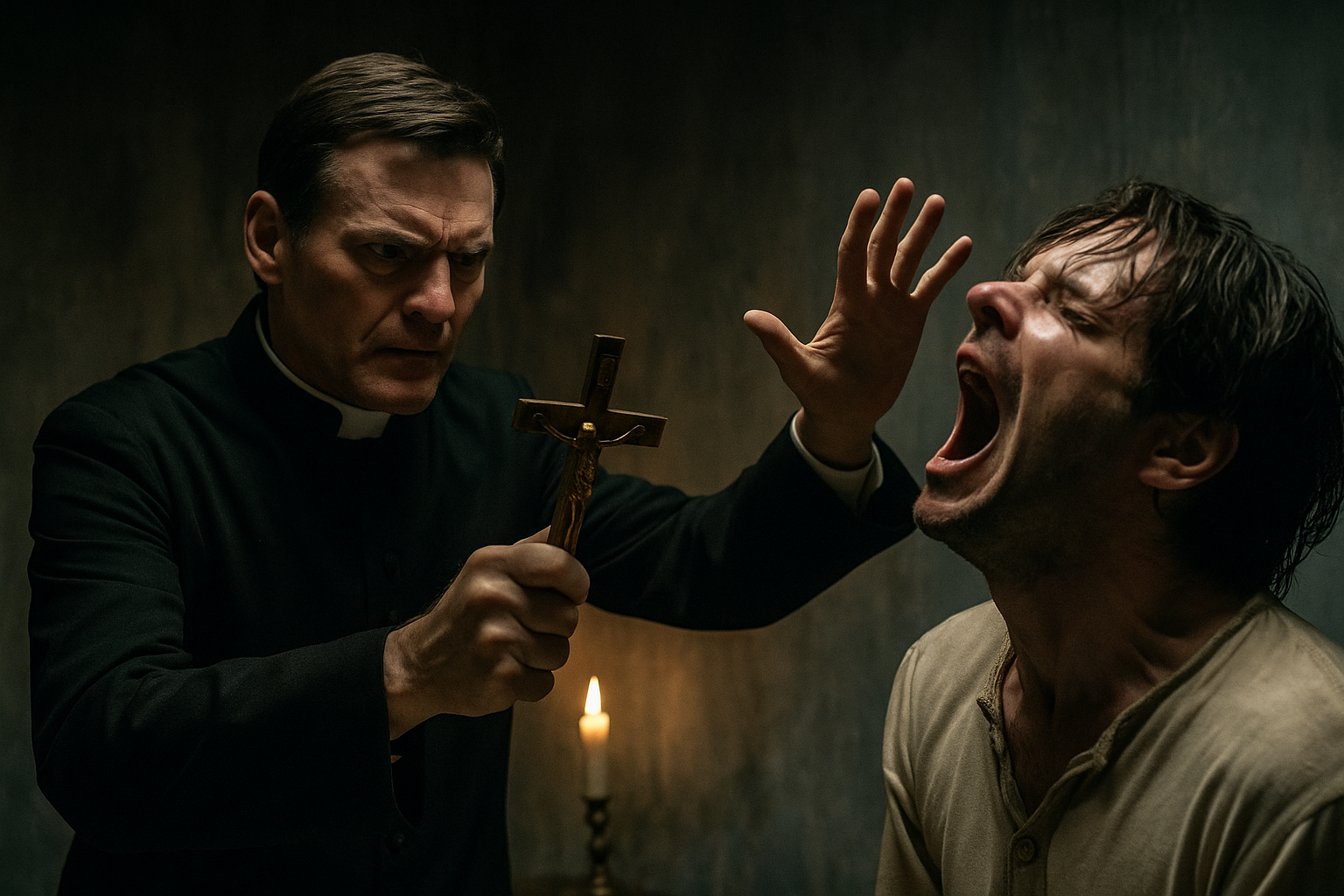An expositional reflection on “A Show in the Shadows”
Introduction
In the short story “A Show in the Shadows“, a Catholic priest named Father Lucien attempts to perform an exorcism on a tormented man named Simon. The result seems successful—until the demon, through Simon, reveals the truth: he never left. The first deliverance was a deception. It was a performance, meant to affirm ritual and false religion.
What follows is more than a second encounter. It is a spiritual reckoning. Lucien discovers that rituals without regeneration have no authority. He repents, believes the Gospel, and only then casts the demon out—with no theatrics, no relics, no saints—just Scripture and the name of Jesus Christ.
But this fictional account is not fantasy. It is doctrinally aligned with the Word of God. In fact, it reveals a spiritual pattern affirmed by Jesus Himself: demons may leave and even pretend to be cast out, only to return later with worse bondage if the person remains spiritually empty.
Part I: Scriptural Foundation Check
“When the unclean spirit is gone out of a man… he saith, I will return into my house… Then goeth he, and taketh with himself seven other spirits more wicked than himself… and the last state of that man is worse than the first.”
—Matthew 12:43–45
Jesus is not speaking metaphorically. He’s describing what happens when deliverance is not followed by regeneration. The spirit leaves, but the person remains vacant—no indwelling of the Holy Spirit, no new birth, no spiritual protection.
This is exactly what happens in the first half of the story. Father Lucien, operating in religious ritual without saving faith, creates the illusion of victory—but the man, Simon, is left worse than before.
Part II: The Nature of False Authority
Lucien represents many in Christian institutions today: baptized, ordained, but unregenerate. His authority is based on tradition, saints, relics, and the hierarchy of the Church—not on Christ alone.
Jesus warned of this directly in Matthew 7:22–23:
“Many will say… Lord, Lord, have we not prophesied in thy name? and in thy name have cast out devils?… I never knew you: depart from me.”
These people used Jesus’ name. But He didn’t know them. That’s the key.
Authority over demons is not in recitation—it is in relationship.
Part III: The Demon’s Strategy—Deception Over Defeat
The demon in the story mocks Lucien’s ritual. It doesn’t resist—it cooperates, reinforcing the illusion that Lucien’s method works. This aligns with 2 Thessalonians 2:9:
“Even him, whose coming is after the working of Satan with all power and signs and lying wonders…”
Demons are not just violent; they are strategic. Sometimes their greatest weapon is compliance—pretending to leave, letting the priest feel victorious, so the false system gains credibility.
This is the “show” the demon refers to—a spectacle that distracts from truth.
Part IV: Deliverance Without Indwelling
This brings us back to Matthew 12:43–45.
When the demon returns, it finds the house “empty, swept, and garnished.” It is not defiled. It is cleaned. But it is unfilled. There is no Holy Spirit within. That’s the problem.
And this is common today—not just in Catholicism, but in many charismatic circles. Ministers focus on casting out demons but neglect preaching the gospel.
Casting out a demon is not salvation.
Only repentance and faith in Jesus Christ brings regeneration and spiritual indwelling (John 3:5; Titus 3:5). If a demon is removed but Christ is not enthroned, the house remains vulnerable.
“Submit yourselves therefore to God. Resist the devil, and he will flee from you.” (James 4:7)
Submission comes before resistance.
Part V: Original Language Insight
In Matthew 12, the demon calls the person “my house”—oikos (οἶκος) in Greek—meaning a place of residence or dominion. When no stronger one takes possession (cf. Luke 11:21–26), the unclean spirit claims it again. And this time, it brings allies.
This explains why people involved in deliverance ministries or religious exorcisms—without Christ—can grow worse afterward. They were not liberated. They were simply rearranged.
Part VI: Real Authority—Regeneration and the Word
When Lucien repents and believes the gospel, everything changes. He no longer depends on rituals. He uses the Word. He quotes Scripture. He acts in the authority of a born-again believer.
Now his authority is rooted in Luke 10:19:
“Behold, I give unto you power… over all the power of the enemy…”
This is exousia (ἐξουσία)—delegated power, given only to those who belong to Jesus. Demons don’t obey church rank. They obey spiritual alignment with Christ.
Part VII: The Final State—The Real Deliverance
In the story’s conclusion, Simon is no longer tormented. He is transformed. He confesses Christ. He is baptized. Not into ritual—but into spiritual reality (Romans 6:3–4).
Lucien leaves the priesthood—not in rebellion, but in obedience. He no longer calls himself “Father” (cf. Matthew 23:9), but a servant. He preaches not tradition, but truth.
And the demons? They stop playing games.
Because the house is no longer vacant.
It is filled.
Conclusion: From Spectacle to Salvation
A Show in the Shadows reveals what many overlook: that real spiritual authority comes from real spiritual life. False deliverance, whether Catholic or Protestant, leads to greater bondage if it does not result in regeneration.
Demons flee not from spectacle—but from Spirit-filled people who speak God’s Word with blood-bought authority.
Let us cast aside theatrical ministry and return to the command of Christ:
“Go ye therefore, and teach all nations… teaching them to observe all things whatsoever I have commanded you.” (Matthew 28:19–20)
Only this will empty hell’s prisons—and fill heaven’s courts.






